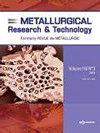Distribution behavior and deportation of arsenic in copper top-blown smelting process
IF 1.1
4区 材料科学
Q3 METALLURGY & METALLURGICAL ENGINEERING
引用次数: 0
Abstract
In recent years, the impurity content in copper concentrate increases gradually with the consumption of high-grade copper ore. When the arsenic content in the raw materials increases, large amounts of arsenic enter the sulfuric acid system, resulting in large amounts of waste acid that put great pressure on production and environmental protection. Using the distribution characteristics of arsenic in each phase, the possibility of enriching arsenic in the form of stable arsenates in the slag was investigated to enrich arsenic in the form of stable arsenates in the slag. It is shown that increasing CaO content in slag at relatively low temperatures, controlling the slag type and changing the slag composition effectively improved the ability of the slag to absorb arsenic. Based on a theoretical analysis used to optimize the process parameters and determine a reasonable slag type, an oxygen-enriched top-blown smelting experiment was conducted with mixed copper concentrates. The mechanism of arsenic fixation in smelting slag at a smelting temperature of 1180 °C (1453 K) was investigated, and the results showed that the As content in slag was increased by 20∼50% and decreased by 10∼30% and 10∼20% in the dust and matte, respectively. Thus, arsenic is fixed in silicate in the form of stable arsenate, which can be an effective and safe treatment solution for copper smelting processes.铜顶吹冶炼过程中砷的分布、行为及排出
近年来,随着高品位铜矿石的消耗,铜精矿中的杂质含量逐渐增加,当原料中砷含量增加时,大量砷进入硫酸体系,产生大量废酸,给生产和环境保护带来很大压力。利用砷在各相中的分布特点,探讨了以稳定砷酸盐形式富集砷在渣中的可能性,以稳定砷酸盐形式富集渣中的砷。结果表明,在较低温度下提高炉渣中CaO含量,控制渣型,改变渣组成,可有效提高炉渣对砷的吸收能力。在理论分析的基础上,优化了工艺参数,确定了合理的渣型,进行了混合铜精矿富氧顶吹冶炼试验。研究了熔炼温度为1180℃(1453 K)时,砷在熔炼渣中的固定机理,结果表明,在炉渣中砷含量提高了20 ~ 50%,在粉尘和磨砂中砷含量分别降低了10 ~ 30%和10 ~ 20%。因此,砷以稳定的砷酸盐的形式固定在硅酸盐中,可以作为铜冶炼过程中有效和安全的处理溶液。
本文章由计算机程序翻译,如有差异,请以英文原文为准。
求助全文
约1分钟内获得全文
求助全文
来源期刊

Metallurgical Research & Technology
METALLURGY & METALLURGICAL ENGINEERING-
CiteScore
1.70
自引率
9.10%
发文量
65
审稿时长
4.4 months
期刊介绍:
Metallurgical Research and Technology (MRT) is a peer-reviewed bi-monthly journal publishing original high-quality research papers in areas ranging from process metallurgy to metal product properties and applications of ferrous and non-ferrous metals and alloys, including light-metals. It covers also the materials involved in the metal processing as ores, refractories and slags.
The journal is listed in the citation index Web of Science and has an Impact Factor.
It is highly concerned by the technological innovation as a support of the metallurgical industry at a time when it has to tackle severe challenges like energy, raw materials, sustainability, environment... Strengthening and enhancing the dialogue between science and industry is at the heart of the scope of MRT. This is why it welcomes manuscripts focusing on industrial practice, as well as basic metallurgical knowledge or review articles.
 求助内容:
求助内容: 应助结果提醒方式:
应助结果提醒方式:


